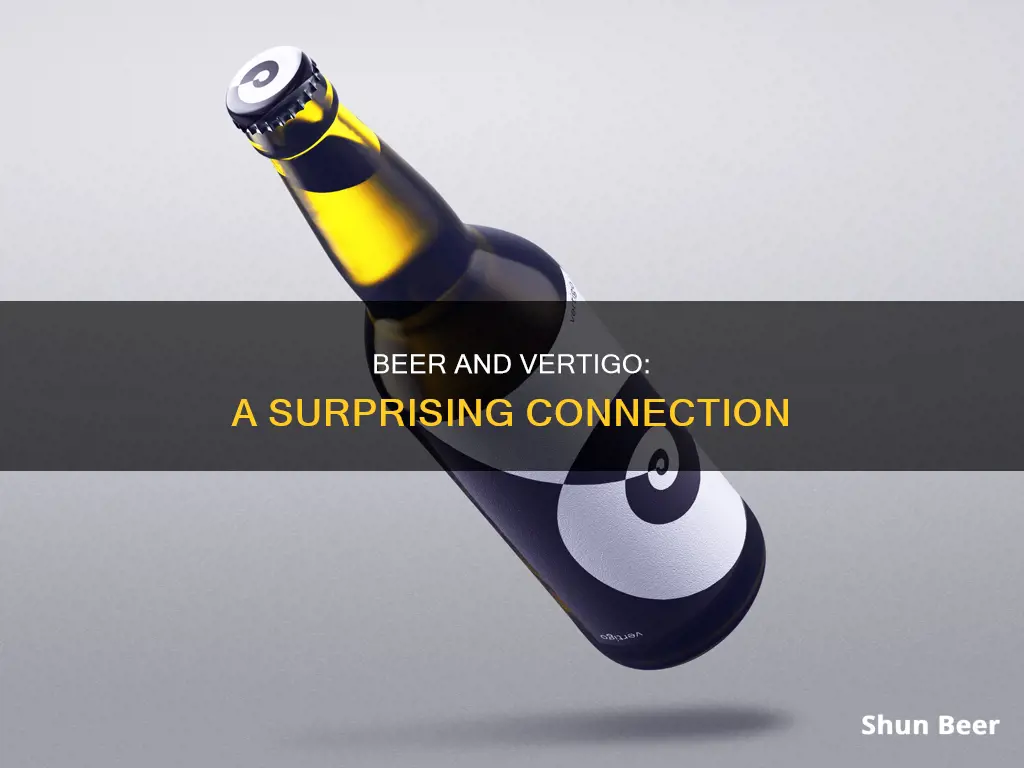
Vertigo is a symptom, not a health condition, and is characterised by a false sense of spinning or movement. It is often associated with a disturbance in the inner ear or the brain's vestibular system, which is responsible for maintaining balance and spatial orientation. Vertigo can be caused by several factors, including benign paroxysmal positional vertigo (BPPV), Meniere's disease, vestibular neuritis, labyrinthitis, and migraine-associated vertigo. Alcohol consumption can also trigger vertigo symptoms, especially in individuals who are susceptible to inner ear disturbances or have a history of vestibular disorders. The link between vertigo and alcohol consumption lies in drinking's ability to impair one's auditory cortex, hearing, and balance.
| Characteristics | Values |
|---|---|
| Alcohol's impact on vertigo | Alcohol can cause vertigo due to its effects on the brain and hearing. |
| Alcohol's effect on the brain | Alcohol impairs the auditory cortex, affecting hearing and balance. |
| Alcohol's effect on the inner ear | Alcohol affects fluid levels in the inner ear, which can result in vertigo. |
| Dehydration | Alcohol is a diuretic, causing dehydration, which can lead to dizziness and vertigo. |
| Blood flow to the brain | Alcohol can alter blood flow to the brain, contributing to vertigo. |
| Vestibular system | Alcohol disrupts the vestibular system, which is responsible for balance and spatial orientation. |
| Individual factors | The impact of alcohol on vertigo can vary depending on individual factors such as overall health, alcohol tolerance, and drinking frequency and amount. |
| Treatment | Limiting alcohol intake and seeking medical help are crucial steps in managing vertigo. |
What You'll Learn
- Alcohol can damage the auditory cortex, semicircular canals, and the vestibular system
- Dehydration caused by alcohol consumption can lead to vertigo
- Alcohol can worsen symptoms of pre-existing conditions like Meniere's disease and BPPV
- Vertigo can be a symptom of alcohol withdrawal
- Alcohol-induced vertigo can occur during or after drinking

Alcohol can damage the auditory cortex, semicircular canals, and the vestibular system
Vertigo is a symptom, not a health condition, that gives a false feeling of movement. It can be caused by problems in the inner ear or the brain. The inner ear contains three tiny canals with fluid, crystals, and tiny hairs that help send signals to the brain about balance and spatial awareness. Alcohol consumption can affect the inner ear and brain function.
Alcohol consumption can lead to dehydration, which reduces the amount of fluid in the inner ear. This can affect one ear and cause an unbalanced amount of fluid, resulting in the ear transmitting conflicting and incorrect signals to the brain, leading to vertigo. This is known as benign paroxysmal positional vertigo (BPPV).
Additionally, alcohol can affect the semicircular canals in the ear, which are normally filled with fluid of the same specific gravity as the surrounding membrane. Alcohol has a lighter specific gravity than water, so when it enters the canal, the specific gravity of the membrane becomes lower than that of the surrounding fluid. This difference in specific gravity can cause positional alcohol nystagmus (PAN), characterised by a visible jerkiness in eye movement when the head is placed in a sideways position. PAN is associated with the unsteadiness, nausea, and vertigo felt by intoxicated people.
Furthermore, alcohol can affect brain function by disrupting neurotransmitter pathways, particularly in the prefrontal cortex, which is involved in executive functions such as attention, planning, and decision-making. Studies have shown that alcohol exposure can lead to structural and functional changes in the prefrontal cortex, including reduced gray matter and white matter volume, altered gene expression, and impaired glucose metabolism. These changes can contribute to cognitive deficits and impaired executive functions.
In summary, alcohol can damage the auditory cortex, semicircular canals, and the vestibular system, leading to vertigo and other negative consequences on balance, spatial awareness, and brain function.
Beer and Passenger Seat: Drinking Laws Explained
You may want to see also

Dehydration caused by alcohol consumption can lead to vertigo
Vertigo is a symptom, not a health condition on its own. It causes a false feeling of movement, as if you or the room around you is moving even when you're not engaging in any physical activity. Vertigo can be caused by a problem in the inner ear or the brain. The former is more common, and excessive alcohol consumption can trigger it.
The inner ear has three tiny canals containing fluid, crystals, and tiny hairs. These canals help send signals to the brain about balance and spatial awareness. Alcohol consumption can affect the inner ear by contributing to dehydration, which can reduce the amount of fluid in the inner ear. This can affect one ear and create an unbalanced amount of fluid. As a result, your ear may transmit conflicting and incorrect signals to the brain, leading to vertigo.
Alcohol also affects the brain and can worsen vertigo symptoms. It can impair the nervous system cells, causing lightheadedness and delayed reaction time. It can also negatively affect the brain by reducing concentration, increasing the risk of stroke, and interfering with how the brain processes information.
Doctors may advise against drinking alcohol if you have vertigo, as it may cause dehydration, which can lead to dizziness. Alcohol is a diuretic, meaning it causes the body to remove fluids from the blood. Therefore, drinking alcohol without pairing it with water can lead to dehydration.
In summary, dehydration caused by alcohol consumption can lead to vertigo by reducing the amount of fluid in the inner ear and causing an imbalance. It can also worsen vertigo symptoms by affecting the brain and causing dizziness. If you experience vertigo, it is advisable to avoid alcohol consumption and stay hydrated to prevent dehydration, which can further exacerbate the condition.
Beer and Kidney Health: What's the Harm?
You may want to see also

Alcohol can worsen symptoms of pre-existing conditions like Meniere's disease and BPPV
Vertigo is a symptom of some ear health conditions and inflammation, causing a false feeling of movement or dizziness. It is not a health condition on its own. However, excessive alcohol consumption can trigger vertigo and worsen its symptoms.
Meniere's disease is an inner ear disorder that results in sporadic attacks of vertigo, hearing loss, aural fullness, and tinnitus. It is believed to be caused by a buildup of fluids and changes in pressure in the ear. Alcohol consumption causes dehydration, which can reduce the amount of fluid in the inner ear, leading to vertigo. Additionally, alcohol causes the blood vessels to constrict, reducing the blood supply to the inner ear, which worsens vertigo symptoms for people with Meniere's disease.
Benign paroxysmal positional vertigo (BPPV) is another condition that can trigger vertigo episodes when making sudden head movements. Alcohol consumption can exacerbate the symptoms of BPPV as it affects the fluid in the ears. Each ear contains three semicircular canals and otolith organs filled with fluid. Within this fluid are tiny hairs attached to nerve cells that translate sound into electrical impulses sent to the auditory nerve in the brain. Alcohol can damage and destroy these tiny hair cells and inhibit their regeneration, resulting in permanent hearing loss.
Therefore, alcohol consumption is not advised for individuals with Meniere's disease, labyrinthitis, or BPPV.
Beer and Lithium: What's the Verdict?
You may want to see also

Vertigo can be a symptom of alcohol withdrawal
Vertigo is a symptom, not a health condition. It is characterised by a false sense of movement or spinning, often accompanied by dizziness, nausea, and difficulty maintaining balance. It can be triggered by a change in the position of your head, and it can last anywhere from a few minutes to a few hours or longer.
Vertigo can be caused by excessive alcohol consumption, which can disrupt the delicate balance of fluids and chemicals in the inner ear. Alcohol affects the vestibular system, which is responsible for maintaining balance and spatial orientation. However, vertigo can also occur during alcohol withdrawal, as the body adjusts to the absence of alcohol and restores normal functioning. This is because, over time, the body becomes accustomed to functioning with less inner ear fluid, and neurons learn to compensate for the altered signals in the ears. As a result, when alcohol is removed during the detox process, vertigo may occur.
Alcohol-induced vertigo can also be a result of long-term alcohol abuse. Prolonged alcohol consumption can cause damage to the inner ear structures, leading to persistent dizziness and vertigo. It is important to address both alcoholism and vertigo to achieve comprehensive recovery.
In addition to vertigo, other symptoms of alcohol withdrawal can include:
- Increased levels of stress hormones, causing sweating, nausea, and vomiting.
- High levels of anxiety, causing irritability, frustration, and sleep difficulties.
- Muscle pain and aches, ranging from tiredness and lack of energy to tightness in the muscles or restless legs.
- Abdominal pain and nausea, which can be caused by the physical and emotional stress of withdrawal.
- Cravings, which can be difficult to eliminate once they have started.
- Brain fog, caused by the disruption of chemicals in the brain that regulate emotions, leading to difficulty thinking clearly, concentrating, and remembering things.
Centrifugal Force: Spinning Beer to Perfection
You may want to see also

Alcohol-induced vertigo can occur during or after drinking
Vertigo is a symptom of a wide range of conditions and is characterised by a false sense of spinning or movement. It is often associated with a disturbance in the inner ear or the brain's vestibular system, which is responsible for maintaining balance and spatial orientation.
Dehydration is a common effect of alcohol consumption, as it is a diuretic, meaning it causes the body to remove fluids. Dehydration can reduce the amount of fluid in the inner ear, affecting one ear more than the other. This can lead to the ear transmitting conflicting and incorrect signals to the brain, resulting in vertigo.
Alcohol also impacts the vestibular system, which is located in the inner ear and plays a crucial role in maintaining balance and spatial orientation. Alcohol acts as a vestibular suppressant, dampening the function of the balance centres in the inner ear. This disruption can intensify the spinning sensation, dizziness, and loss of balance associated with vertigo.
In addition, alcohol can affect the brain and impair nerve cells, causing lightheadedness and delayed reaction times. It can also damage the auditory cortex, the region of the brain responsible for processing auditory information. This can make it difficult to understand speech and distinguish voices or sounds from background noise.
The effects of alcohol on vertigo can vary depending on individual factors such as overall health, alcohol tolerance, and the amount and frequency of alcohol consumed. However, consuming alcohol can increase the risk of experiencing vertigo episodes, especially for individuals who are already prone to vertigo or have underlying vestibular disorders.
Drinking Beer at Foroya Bjor: What's the Deal?
You may want to see also
Frequently asked questions
No, drinking beer can trigger vertigo. Alcohol consumption can worsen vertigo symptoms and cause spatial disorientation.
Vertigo is a sensation of dizziness that causes people to feel that their surroundings are spinning. It is a symptom of some ear health conditions and inflammation.
Vertigo is often caused by a disturbance in the inner ear or the brain's vestibular system, which is responsible for maintaining balance and spatial orientation.







